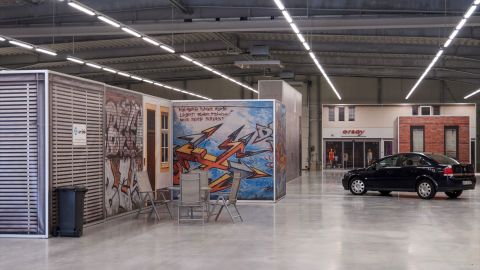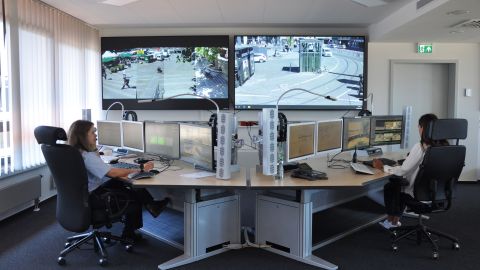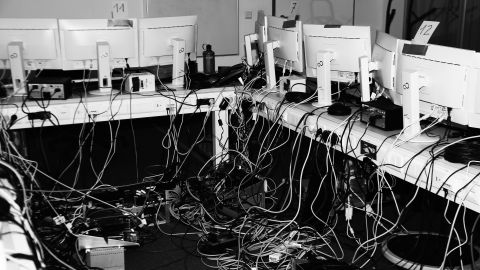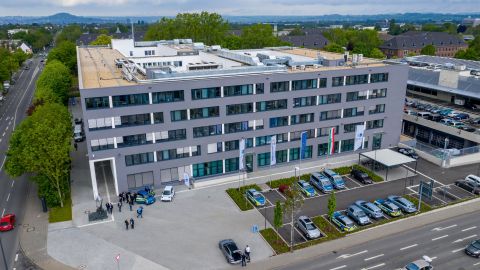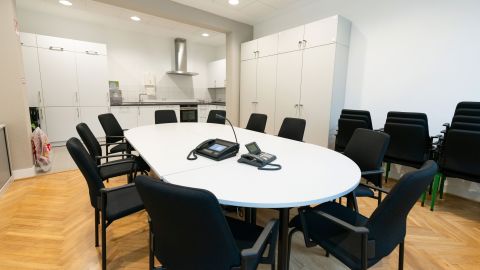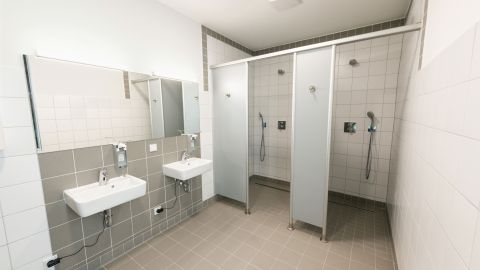"A good portion of our approximately 1,000 police properties are not in good condition," says Prof. Dr. Klaus Schönenbroicher. The Senior Ministerial Councillor in the North Rhine-Westphalian Ministry of the Interior sees the challenge. A number of police buildings are in need of complete renovation, others are too small in view of a "growing administration" with many additional police employees within a decade. "We simply need more modern building space."
Schönenbroicher is pleased that Interior Minister Herbert Reul has succeeded in including around 680 million euros in the budget as commitment appropriations for the state's police in tough negotiations with the Finance Minister since 2018. This has enabled numerous other projects to be initiated up to 2022. First and foremost, the senior official from the Ministry of the Interior mentioned the tender for a new police station in Münster with almost 37,000 square meters of rental space. The refurbishment of the police stations in Hagen and Oberhausen, the tender for the new main buildings in Bergheim and Schwelm, the relocation of the riot police unit and special units in Bielefeld, the construction of regional training centers and the construction of numerous large and small police stations have now also been initiated. Examples include the police stations in Ratingen, Ahaus, Velbert, Ibbenbüren, Ochtrup, Emmerich, Bad Godesberg, Hohenlimburg, Ruhrort and Büren.
In order to be able to implement additional projects, the local police authorities would also have to get involved. Spatial plans need to be drawn up and the respective user target determined. This cannot be done centrally alone, says Schönenbroicher. "It is part of the official duties of authorities to keep property plans constantly up to date."
He praises the State Office for Central Police Services NRW (LZPD), which has developed an effective property system since 2011. "The management and control works excellently and is also recognized by the market partners," says the honorary professor at Ruhr University Bochum. The state has recently demonstrated how the everyday life of the police can be modernized with a series of new buildings and renovations. Here are just a few examples:
Police headquarters in Mönchengladbach
The police headquarters in Mönchengladbach, which was completed in 2017, is now state of the art. The well-equipped control center has increased the ability to respond to police operations. In addition, the headquarters building, with a rental area of almost 18,000 square meters, houses the most modern forensic investigation center in North Rhine-Westphalia. The enlarged police custody facility improves accommodation and security. The police riot squad also benefits from the fast highway connection. The five-storey, 160-metre-long building is also bright, barrier-free and citizen-friendly.
Düsseldorf police headquarters
The listed Düsseldorf police headquarters, which dates back to 1928, has been undergoing renovation and expansion for several years. The control center, which fits seamlessly into the ensemble, was handed over at the beginning of this year. Colleagues praise the sophisticated technology, which is precisely tailored to the needs of the police. Two further extensions were cleverly slid into the open space between the blocks. The new underground garage covers the parking requirements.
Essen police headquarters
In Essen, the police headquarters has found a new home for large parts of its workforce in the former Karstadt headquarters in Bredeney. The building, including the outside areas, has been planned since the end of 2017. The rented 26,800 square meters were tailored to the needs of the police in just 1.5 years. The main building was completely renovated and the cubage inside was adapted. A vehicle workshop, a training tower for the special units and various carport facilities for the BPH vehicle fleet were newly built. The office building is now home to the southern police station including the police station, various criminal investigation departments, the police medical service, large parts of the ZA directorate, the riot police unit and the special units; a total of around 700 employees have been working at the site every day since August 2020.
Police headquarters Wuppertal
The listed police headquarters building in Wuppertal, which dates back to the 1930s, has been undergoing extensive refurbishment since 2012 to bring it up to today's standards. Here, Bau- und Liegenschaftsbetrieb NRW is doing an excellent job of preserving the building fabric, which is also worthy of protection from a police history perspective, on the one hand, and of creating modern workspaces for the diverse areas of responsibility of a police headquarters on the other.
Regional training centers
The Ministry of the Interior also attaches great importance to optimizing the education and training conditions for the police. The two empty halls of the NRW Materials Testing Office in Dortmund have been converted into the Regional Training Center Ruhr Area East with a total rental area of 6,900 square meters. Bau- und Liegenschaftsbetrieb NRW operated in close coordination with the police. First, test benches, compressors and hydraulic systems had to be dismantled. The opening was in 2016.
3,300 police officers from Dortmund, Unna, Soest and Hagen now train there. In one hall, they are confronted with critical situations in their everyday work. In the training building, typical operational locations such as custody, bank counters, stores, pubs, offenders' apartments and classrooms are recreated. In the control room, the lighting can be controlled, sounds can be recorded and even fog can be produced. The actions recorded by cameras from different perspectives can be seen on various monitors to allow for maneuver criticism. Four shooting lanes are available in the hall opposite to improve accuracy. A computer-aided video system projects the targets onto the walls.
In Schloß Holte-Stukenbrock near Bielefeld, on the other hand, a training center for the police was built in an open space. The police property offered enough space to implement the model planning of the Ministry of the Interior in an ideal way.
It is important to replace dilapidated buildings in the area, says Prof. Schönenbroicher. In the Ennepe-Ruhr district, the district police authority was granted funding for the construction of a new, modern central police building in 2019. 8,000 to 9,000 square meters of space for 250 officers, a control centre, a police station and a modern custody facility are to be built. The property currently in use has not met the requirements for a long time. The employees are already looking forward to clean changing and recreation rooms as well as friendly offices.
Several other projects have been implemented over the past five years, including the construction of the state-of-the-art Aachen police headquarters and the renovation of the old town police station in Düsseldorf. So a lot has already been done. And yet Prof. Schönenbroicher still anticipates a very high need for refurbishment. Long-term tenancy agreements are expiring and dozens of buildings are slipping into obsolescence. Unfortunately, the allocation of funds over a long period of time was not in line with demand, he complains. "The state of North Rhine-Westphalia must work hard to ensure that police officers have attractive working conditions everywhere." But it can be done.
